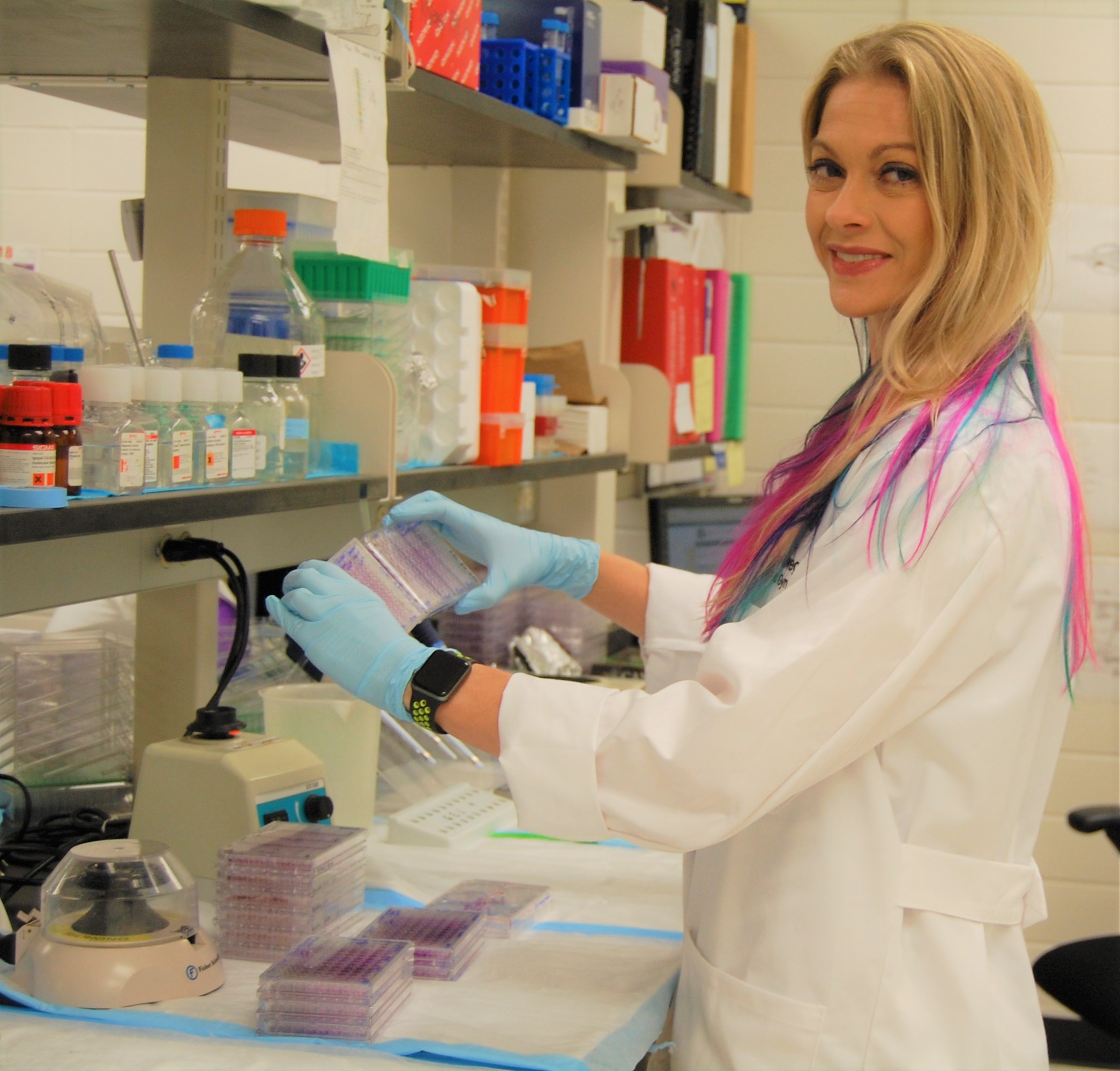Kristin Altwegg Receives AACR Scholar-in-Training Award

UPDATE: The AACR Annual Meeting 2020 has been terminated and will be rescheduled for later in the year. Learn more.
 Kristin Altwegg, a third-year student in the cancer biology discipline of the Integrated Biomedical Sciences program has just received the AACR Scholar-in-Training award. She is in the lab of Ratna K. Vadlamudi, Ph.D. According to the AACR website, Scholar-in-Training Awards are highly competitive and recognize outstanding young investigators presenting meritorious proffered papers at the AACR Annual Meeting.
Kristin Altwegg, a third-year student in the cancer biology discipline of the Integrated Biomedical Sciences program has just received the AACR Scholar-in-Training award. She is in the lab of Ratna K. Vadlamudi, Ph.D. According to the AACR website, Scholar-in-Training Awards are highly competitive and recognize outstanding young investigators presenting meritorious proffered papers at the AACR Annual Meeting.
Here’s a quick Q&A with Kristin about the award.
1) Why are you excited to receive this award?
Not only are AACR-SITA awards highly competitive and prestigious, they are presented to those with high-quality abstracts and applications from a candidate pool of hundreds. I am overjoyed at my success as it reflects positively on my doctoral training, my mentor Dr. Vadlamudi, and my institution UT Health San Antonio! I am incredibly honored to be recognized at the Scholar-in-Training Awards Reception will be help April 25, 2020. In addition, this award covers funding for travel, sustenance, and lodging at AACR in San Diego, CA. This gives me financial support to attend AACR without utilizing Dr. Vadlamudi’s travel funds, or my CPRIT pre-doctoral fellowship travel funds. In the long term, by allocating my travel funds carefully I hope to attend Gordon Research Conference, Keystone Symposia, and SABCS 2020!
2) Will you be presenting a talk or poster at the conference?
I will be presenting a poster (20-A-6944-AACR) titled Characterization of Small Molecule Inhibitors of PELP1 for Treating Advanced Breast Cancer on Wednesday, Apr. 29, 2020 during the session on Experimental and Molecular Therapeutics.
3) Tell me about your research and why is it important to share with the AACR community.
I work on developing novel small molecule inhibitors targeting proto-oncogenic PELP1 in both therapy resistant and triple negative breast cancers Breast cancer (BCa) is the most common malignancy in women, the second leading cause of cancer-related deaths after lung cancer. The majority of BCa (70%) is estrogen receptor positive (ER+). However, most patients develop therapy-resistance (TR-BC), frequently progressing to metastases. In addition to ER+ BCa, approximately 15% of BCa diagnoses are categorized as triple negative BCa (TNBC) because they do not express the canonical molecular drivers: ER, progesterone receptor (PR), and HER2. TNBC is associated with a younger age at diagnosis (<40 years), advanced stage at diagnosis, predominance in African American or Hispanic ethnicity, and a more aggressive clinical course. Overall, TNBC has a higher propensity to metastasize, worse prognosis, and contributes a disproportional share of the total mortality from BCa. TNBC is nonresponsive to many of the effective drugs targeting ER/PR or HER2. My doctoral work is geared toward development of novel effective therapies for women with TR-BC and TNBC with the overarching goal of improving patient survivorship.
4) What do you hope to gain out of this conference?
I hope to learn and discuss cutting edge scientific techniques and methods. There are many speakers and presenters that I am looking forward to hearing and hopefully meeting. I am interested in interacting with colleagues who will be future collaborators and mentors, people who share the similar research interests as mine, and especially looking at potential postdoctoral mentors.
5) What are your future plans?
I am very interested in continuing in academia after the completion of my predoctoral work. I have already begun looking at postdoctoral positions at top tier institutions who have thriving programs in breast and gynecological cancer research, endocrinology, aberrant hormonal signaling in cancers, cancer metabolomics, and the intricate effects of the immune system on the tumor microenvironment.
